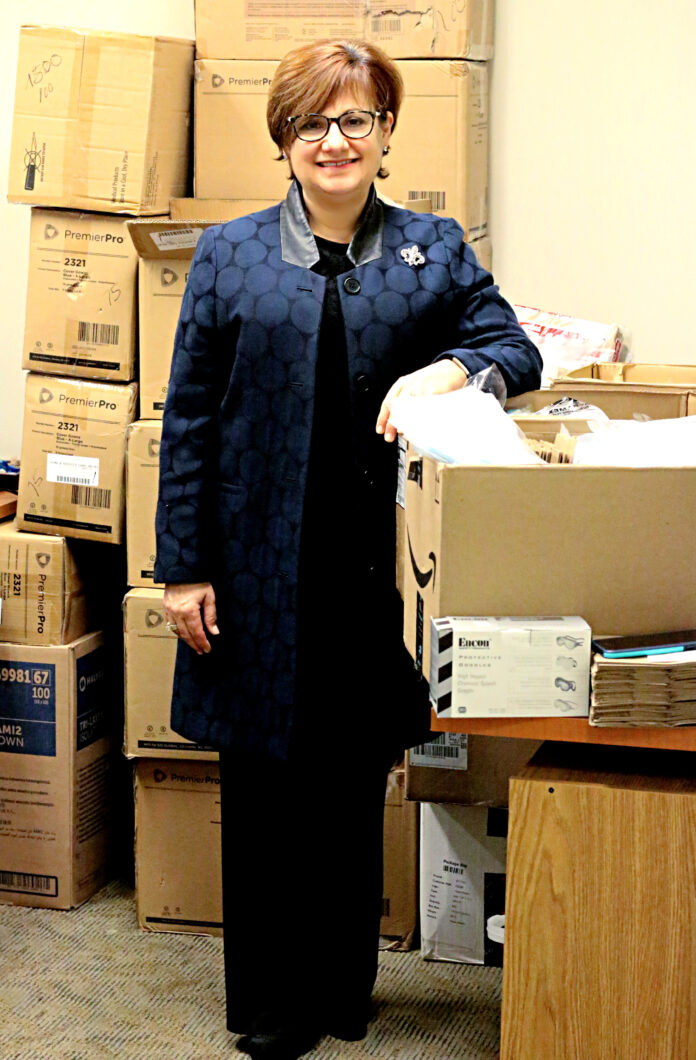Diana Franchitto is the CEO and president of HopeHealth in Providence, a nonprofit health care organization that supports patients and their families through all stages of illness in Massachusetts and Rhode Island. Franchitto said that three of 628 employees tested positive for COVID-19 and are home recuperating. Since her staff works on the frontlines of the crisis, her administration formed an Emergency Management Team to handle pandemic related issues at the outset of the crisis.
Franchitto, who has been CEO of the HopeHealth since 2008, said Maureen Bischoff, who is the organization’s chief operating officer, “launched our first Emergency Management Team meeting on February 26, and we simultaneously launched the incident command structure we already had in place” as part of safety protocols.
“I have certainly had a few sleepless nights worrying about staff, my family and all sorts of other COVID-19 related concerns,” she said. “At the same time, I have found strength in leading such a courageous, compassionate team. I have been stretched to think differently about leadership during a crisis and am continually reminded of how vital it is to connect with all of our staff and leaders with compassion and clarity.”
Franchitto said approximately 20% of HopeHealth’s employees are working remotely, while “the remainder are frontline caregivers caring for patients and their families in homes, nursing homes, assisted living facilities, hospitals and the HopeHealth Hulitar Hospice Center. We proactively launched a robust personal protective equipment protocol very early in the pandemic and our workforce has not been as severely impacted as others, for which we are grateful.”
PBN is asking local business owners and CEOs five questions in a survey designed to understand how the new coronavirus has affected them and their businesses and what they have learned from the unprecedented challenges. Here are Franchitto’s responses:
How are you coping amid the COVID-19 crisis?
HopeHealth cares for people during one of the most vulnerable times in their lives, whether recuperating from surgery requiring visiting nurses and therapists to care for them at home, or facing their last months of life being cared for by their hospice team. What is already a high anxiety time became even more complex with the COVID-19 crisis and HopeHealth had to double down on our efforts to care for our staff so that they could continue to care for patients and families who are experiencing intense emotions further complicated by COVID-19.
In addition to all of the standard emergency management initiatives we put in place, we surveyed our staff to find out what they needed during this time and one of the suggestions our staff made was to encourage the Emergency Management Team to hear from staff on the front lines. So, we instituted “Tales from the Front Lines,” where clinicians from the front lines would join our daily Emergency Management Team meetings to talk about their experiences and we learned a lot. The challenges they were facing helped the Emergency Management Team focus its efforts on particular areas that the staff were finding challenging. We knew that if we supported our staff well during this crisis, they in turn would be able to continue the important mission of HopeHealth in caring for our patients and their families even through a pandemic.
Have you found silver linings in these difficult times?
I feel very fortunate to lead an organization made up of people who wake up each day ready to make a difference in the lives of our patients and their loved ones. During this time, I’ve heard countless stories of our staff FaceTiming a COVID-19 patient’s family so that they can see them for the first time in months or to say goodbye in their final moments of life. I’ve seen our nurses and social workers coordinate with nursing home staff to have a patient’s pet visit her outside her window. I’ve witnessed our grief support team offer community support through virtual means during a time when people are faced with grief more than ever before. Our volunteers have found ways to continue to support our organization through reading stories to our patients telephonically and sewing protective gowns for our frontline staff. Several of our volunteers have sent cards to our staff to thank them for the work they’re doing and to encourage them. It’s been wonderful to witness the many ways we’ve adapted to continue our mission of offering care, comfort and compassion to our community.
How are you maintaining your company culture?
HopeHealth’s team-based care model is an essential component of our work and not being able to connect in person with colleagues gave way to a sense of isolation and lack of connectedness among and between our staff. When the pandemic first broke out, I asked staff to send photos of themselves and we created a compilation video of the photos so that our staff could see each other and gain a sense of connection. We’ve launched three employee support groups, and I also start each week by sending either a video or voice message to update and encourage all 628 employees at HopeHealth. Finally, our COVID support email box is managed 24/7 and provides real time answers to employees’ questions. Communication has been key to maintaining HopeHealth’s culture of connectedness.
Did your business continuity plan work or were there surprises?
I’m tremendously proud of the work of our COVID-19 Emergency Management Team. We continue to rise above fluctuating circumstances. From adapting to the frequently changing CDC PPE utilization protocols, to caring for patients with telehealth, to fixing surprising problems, like needing to find reliable, clean bathrooms for our field staff to use while on the road caring for patients.
Do you have advice for other local companies?
When we kicked off our Emergency Management Team, we acknowledged that this was going to be a highly stressful time for our team and that nerves may get frayed during this time. It was important for our Emergency Management Team to commit to having a unified approach and that the organization is relying on this team to manage and lead through this pandemic. The other piece of advice is to keep the voice of your employees represented in decisions you make as they are as committed as you to the guiding principles of your mission. If there’s one thing this situation has taught us, it’s that we are stronger together.
Cassius Shuman is a PBN staff writer and researcher. He can be reached at shuman@pbn.com.












